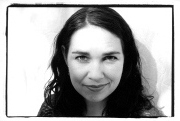An Introduction

Place Poetry Or 'How To Arrive Somewhere You've Never Been'

My early memories are of small Canadian cities filled with brick and stucco buildings, L-shaped shopping centers and subdivisions where every fifth house was identical. Convenience stores, strip malls and parking lots were the landmarks I used to navigate my childhood. And navigation was a necessity because my family moved every year or two to a different part of Ontario, following my father through a series of promotions. ‘Home’ meant the place where you kept your bed. In that way it’s odd that I’ve become a writer of ‘place’. That place is as important to me as character or plot, or, in poetry, as idea.
In Timmins, Ontario there was a birch lot at the edge of the development we lived in. After school my friends and I would walk into the woods, peel birch bark into strands and then head down to the creek to catch tadpoles and crayfish in Campbell’s soup cans. The birch trees, afternoons spent ice-skating on frozen ponds and riding my neighbour’s horse around a cut hay field are what I remember of nature. My family, as a rule, did not ‘do’ nature. They also did not read. Bookshelves, at least what I remember of them, were filled with my mother's medical books (she was a nurse), a few romance paperbacks, an old set of encyclopedias and knick-knacks from my parent’s trips away (Dutch clogs that fascinated me, a large sea shell that I’d put to my ear daily because I swore I could hear the ocean). Despite the lack of a communal family library, I read voraciously as a child -- but always books intended for children my age. I lived very much in my imagination. By the time I was ten, I was submitting fake book reports to my teacher -- ‘book reports’ based on stories I made up myself -- the titles, characters and plot summary pulled out of my daydreaming head.
When I was seventeen I set off to backpack for a month through England and Ireland. The world, in one fell swoop, became electric. By the time I was eighteen I was living in Dublin and slinging pints at a city pub. One afternoon, standing in a queue at the Post Office on O’Connell Street, I put my finger in the pock of a bullet hole from the 1916 uprising. History shot through me as if it were still alive. I’ve always maintained that Ireland made me a writer. Living in a small Rathgar flat with no television or radio, I began again to turn to books; books that challenged and influenced me, that demanded I pay attention.
I remember my mother telling me at an early age that she worried I'd 'always live in a fantasy world.' To this day I still have the uncanny and often embarrassing ability to appear completely daft in the middle of perfectly logical conversations. I write mostly, in one guise or another, about the ‘larger’ past, about how place makes us who we are, how history informs us. Although looking at my own biography I suppose there is a way in which that idea isn’t true. Sometimes place makes us ‘Other’. What I perceived to be the ugly modernity of Canada in the 1970’s and 80’s sent me to another culture to find what I was looking for -- a sense of history in the everyday. To that end, the places that I write about in my fiction and poetry rarely resemble the world in which I was raised.
I once told a group of University students that to be a writer one needed to procure wisdom, knowledge or wonder or a decent mix of the three. I wanted someone to challenge the adage but no one lifted so much as a finger. Anyway, the idea holds true for me because I remember how becoming a writer took place concurrently with discovering wonder -- which is nothing less than opening your eyes to the world in which you happen to be.
Read More ... In this Spinning World
Picture: © Glenn Hunter
|





